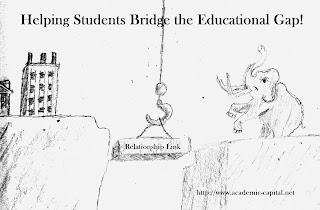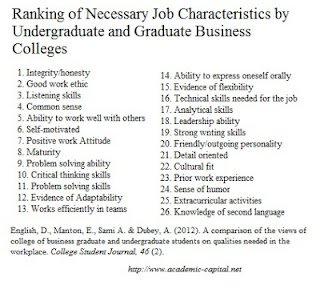Education is a process that helps students widen their
understanding of their fields of study as well as the world around them. The
problem is that many colleges may not be aware of whether their students are
actually learning. As colleges seek to improve learning assessment in light of
budget difficulties they are seeking ways of assessing learning. However, such
assessments may actually fail in their overall ability to determine higher
levels of student learning. A single method of assessment may not actually be
telling the whole story.
Teaching is an important component of any quality of
education. Through this understanding we see that all universities should
continuously improve upon their teaching methods as much as possible. A study
by Pritchard, Saccucci, and Potter in 2010 helps highlight how one AACSB
accredited school improved upon their teaching practices by focusing closely on
their mission statement.
The mission statement is the main guide by which all other
functions of the organization are derived. In order for the organization to effectively
use this mission statement they should use it as an overriding philosophy to
measure effectiveness as well as a way to review those measurements for
continuous improvement. The process should be one that continually analyzes
itself for improvement and development.
This study was longitudinal by nature and looked at teacher
and program effectiveness over a period of 12 semesters. They measured the
teaching quality by using a SIR II assessment given to students every class and
every semester. Each professor was required to do an analysis of their teaching
results as well as a personal plan of improvement. The assessment design helped
teachers to use data to reflect on their overall performance and find ways to
improve.
The results showed that even though professors were seeking
overall improvement they did not actually get it. It was also found that
students were more engaged in class and putting forward more effort but did not
actually learn more. The results of individual analysis did change over time
but the single measure was relatively ineffective in assessing what was occurring.
Since the study relied only on SIR II the results were
skewed. Proper assessment of instructors and overall learning of students
requires multiple avenues of assessment in order to assess complex teaching
well. Furthermore, programs themselves may require multiple assessments and
ways of looking at learning in order to adequately reflect what is occurring.
However, the process of assessment, analysis of results, and implementation of
the results remains a valid method of improving student learning.
Pritchard, R., Saccucci, M. & Potter, G. (2010). Evaluating
a program designed to demonstrate continuous improvement in teaching at an
AACSB-Accredited college of business at a regional university: a case study. Journal of Education for Business, 85.

